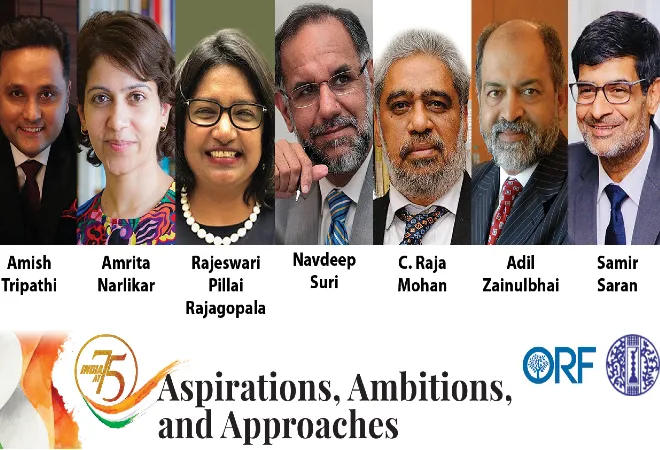-
CENTRES
Progammes & Centres
Location

India celebrates 75 years of independence in 2022. This event, organised by the Observer Research Foundation in collaboration with the Nehru Center, London, and seeks to answer questions that are key to the present and future of this thriving independent nation.
The panellists were introduced by Mr Amish Tripathi, Director of the Nehru Center London, and the discussion was moderated by Dr Samir Saran, President of the Observer Research Foundation.
The first speaker was Mr. Adil Zainulbhai, Chairman of the Capacity Building Commission, and Quality Council of India. He spoke about the importance of “Digital India'', and the impact it has made in India. Today 99 percent of villages in India have 4G connectivity, and that this tool has reduced the time and infrastructure gap between a poor farmer and a middle-class family in a Tier 1 or 2 city. He also elucidated on the fact that India has become a leader in delivering “population scale solutions at start-up speed”, giving examples from programmes such as AADHAR (Social Security Identification), UPI (United Payments Interface) and COWIN (India’s COVID App). The third leitmotif Mr. Zainulbhai touched up on was the maturation of the Indian startup ecosystem, citing the boom in unicorns as proof.
Dr Rajeswari (Raji) Pillai Rajagopalan, Director of the Center for Security, Strategy and Technology (CSST) at ORF articulated the effects of a recently liberalised space industry in India and the shift of the centre of gravity of this industry to Asia. She explained that there are still many issues that need to be rectified, such as increasing space debris/waste and weaponiaation of space that cannot be fixed without effective domestic and global governance regarding space. She appreciated the progress made by the Indian Space Research Organisation, yet maintained that India must encourage private sector growth in space if it is to maintain parity with the rest of the more developed world.
Next, Professor Amrita Narlikar, President of the German Institute for Global and Area Studies (GIGA), spoke about the possible opportunities that the “Crisis of Multilateralism” gives rise to. She highlighted the failure of the US policy in Afghanistan and the paper written by Dr Samir Saran on the failures of the WHO with regard to the coronavirus pandemic as examples of the failures of the multilateral order. She argues that India is placed in an ideal role to carve out its place as a major stakeholder in the global centre stage, and that India can play a leading role in reforming the currently dysfunctional multilateral order to better fit the needs of the future. She elucidated that India’s careful approach to globalisation is better regarded today, compared to pre-pandemic. She also spoke of the collaborative role that the EU and India could play together, especially considering their shared set of values. In light of international developments like the Russian threat to Ukraine and Germany's energy dependence on Russia, she highlighted the merit of sustainable and secure supply chains for critical goods.
Ambassador Navdeep Suri spoke next, talking about the ‘India Story’ of the past and of the future, with regard to economic diplomacy architecture. He emphasised the Indian developmental diplomacy model, comparing it with the Chinese model, and talking about how it proves more viable in the long term. Unfortunately, due to the defunding of western aid programmes, many leaders are forced to give in to the Chinese demands as they are the only ones providing sizeable developmental aid. India lags behind in monetary value, yet is quite consequential to many nations. India’s focus on capacity building and the host nation taking responsibility is very attractive to nations looking to build their nations in the long term. The ability to keep building on and improving our developmental programmes will play a key role in forming a viable alternative to traditional the western or new Chinese aid.
Finally, Professor Raja Mohan, Director of the Institute of South Asian Studies at NUS, expressed his opinion that the increase of the importance of India, both economically and politically, has brought with it its own new set of challenges. He vocalised the idea that a nation like India has the ability to shift the balance of power internationally due to its weight and unique position on the global stage. He re-emphasised the changes in defining globalisation, agreeing with the fact that the old model for globalisation has not been ideal for a large part of the world. India must be proactive and take the lead as our importance in the world rises. He then shifted geographies and verbalised the new ‘realism’ in Washington when it comes to dealing with Russia, and President Biden’s observation that Russia needs to be accommodated in certain things if the US is to effectively counter the growing Chinese hegemony over Asia. He argued that the European Security Order must be reformed and include Russia to see greater stability and security in Europe. The issue here remains the internal contradictions of Europe, especially when it comes to dealing with the Russian chest-beating.
Dr Saran brought the discussion to a close by asking the panellists how India is supposed to accomplish these tasks, with various opinions expressed by the panellists. What is clear is that as India enters the 75th year of its independence, there are thought processes and principles that need to be adjusted if India wants to continue growing and eventually re-take its place as one of the most important economic and geo-strategic regions of the world. All panellists expressed optimism and hope for the next generation of Indian policymakers, who are entering a far different world than the ones they entered at the beginning of their careers, believing that the future of India looks far brighter than its recent past.
This event report has been written by Shaumik Roy
The views expressed above belong to the author(s). ORF research and analyses now available on Telegram! Click here to access our curated content — blogs, longforms and interviews.